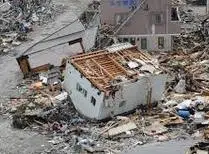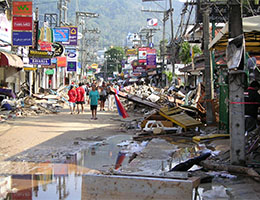 A disaster is an unfortunate, unfortunate or tragic event. Natural , for its part, is that linked to nature.
A disaster is an unfortunate, unfortunate or tragic event. Natural , for its part, is that linked to nature.
The idea of a natural disaster , therefore, refers to an unfortunate or fatal event that occurs due to the action of the forces of nature , without the human being being directly responsible. For example: “This country has suffered major natural disasters throughout its history,” “A natural disaster caused more than a thousand deaths on the African continent,” “There are natural disasters that can be prevented with infrastructure works.”
An earthquake , an avalanche , a tsunami , a flood and a hurricane are some of the natural disasters that can generate enormous damage and cause the loss of thousands or millions of lives. Specifically, these are natural phenomena that can lead to the development of a disaster.
For this reason, it is often stated that there are no natural disasters, but rather natural phenomena that, when governments do not take the necessary prevention and response measures, generate disasters . Take the case of a tsunami . Currently, the necessary technology exists to anticipate its emergence. National authorities, in this framework, must constantly analyze the variables that can anticipate a tsunami to be in a position to issue alerts and evacuate the affected areas. They also have to reinforce water containment and build evacuee centers. In this way, it is possible to ensure that the natural phenomenon does not become a natural disaster, or at least minimize its impact.
There are phenomena that cannot be predicted, such as earthquakes . What can be done is avoid large settlements in high- risk areas, reinforce buildings and develop contingency plans to respond to a possible natural disaster.
The education of the population is the key to solving almost all the problems that a country may face throughout its history. It is thanks to the simple transmission of all the knowledge that our species has been collecting since its origins that we can continue to advance, building better cities, making better political decisions, discovering new cures for the most terrible diseases and confronting the phenomena more effectively. so that they do not always become natural disasters.
 Although earthquakes and tsunamis are not common in all countries, to name just two phenomena of this type, living far from them does not mean being completely safe. In fact, tourist destinations are often found in regions with these and other dangers . For this reason, it is necessary to learn how to act correctly in the event of a natural disaster, and also to obtain information before making a trip to know the addresses of health centers and emergency assistance, among other offices of interest in these cases.
Although earthquakes and tsunamis are not common in all countries, to name just two phenomena of this type, living far from them does not mean being completely safe. In fact, tourist destinations are often found in regions with these and other dangers . For this reason, it is necessary to learn how to act correctly in the event of a natural disaster, and also to obtain information before making a trip to know the addresses of health centers and emergency assistance, among other offices of interest in these cases.
Earthquakes can be very destructive, but there are certain measures that can help us deal with them:
* Identify the safest places in our home and in the buildings we visit frequently, such as the school and office. The most recommended are solid wood door frames and furniture;
* Have a first aid kit , drinking water and cans of non-perishable food near these places, as well as tools that help us get around, such as flashlights, remembering to include at least one spare battery.
In the event of a tsunami, another of the most terrifying natural disasters, only the second piece of advice is useful, since the wave usually destroys all the buildings in its path, which is why it is advisable to move away from the coast as soon as possible.
